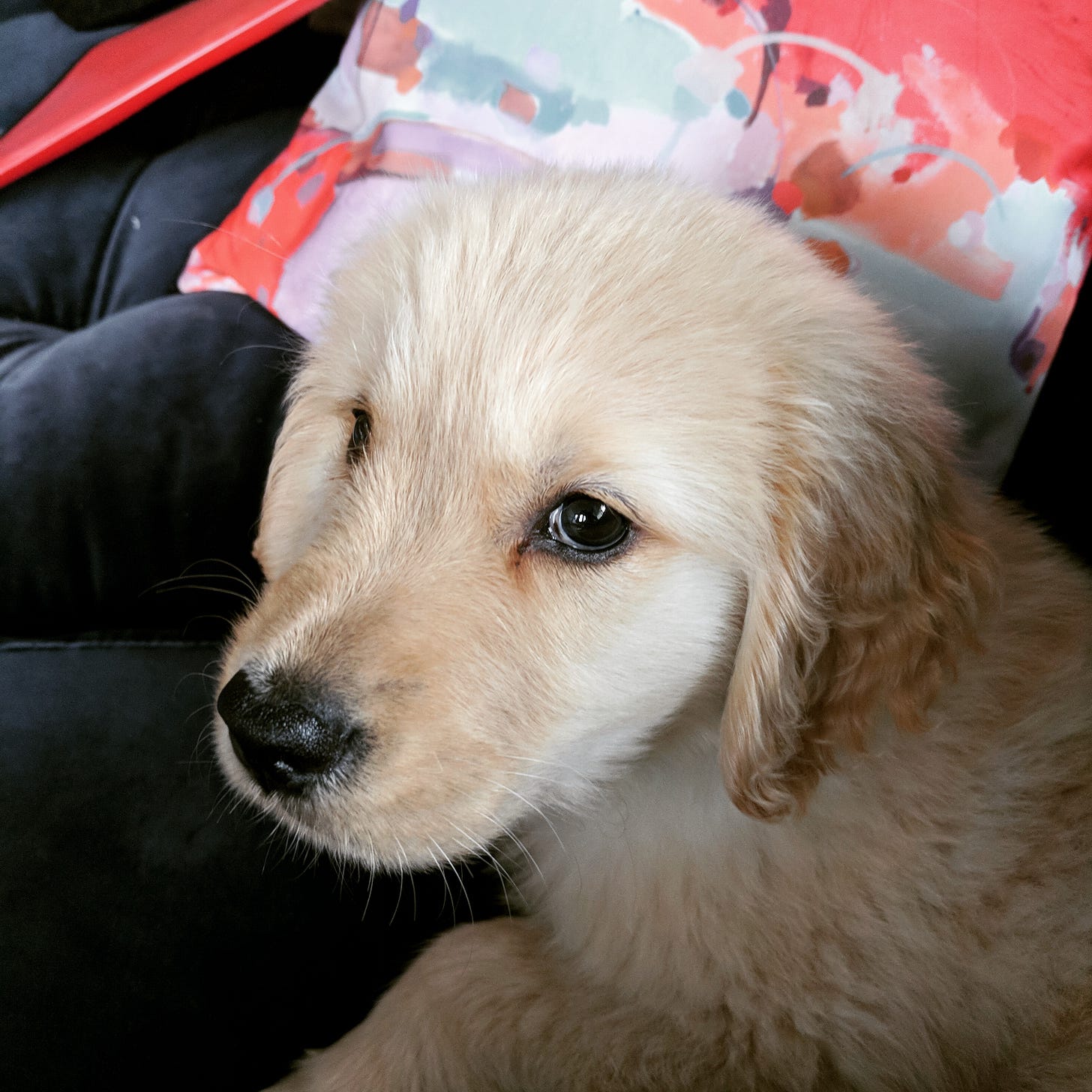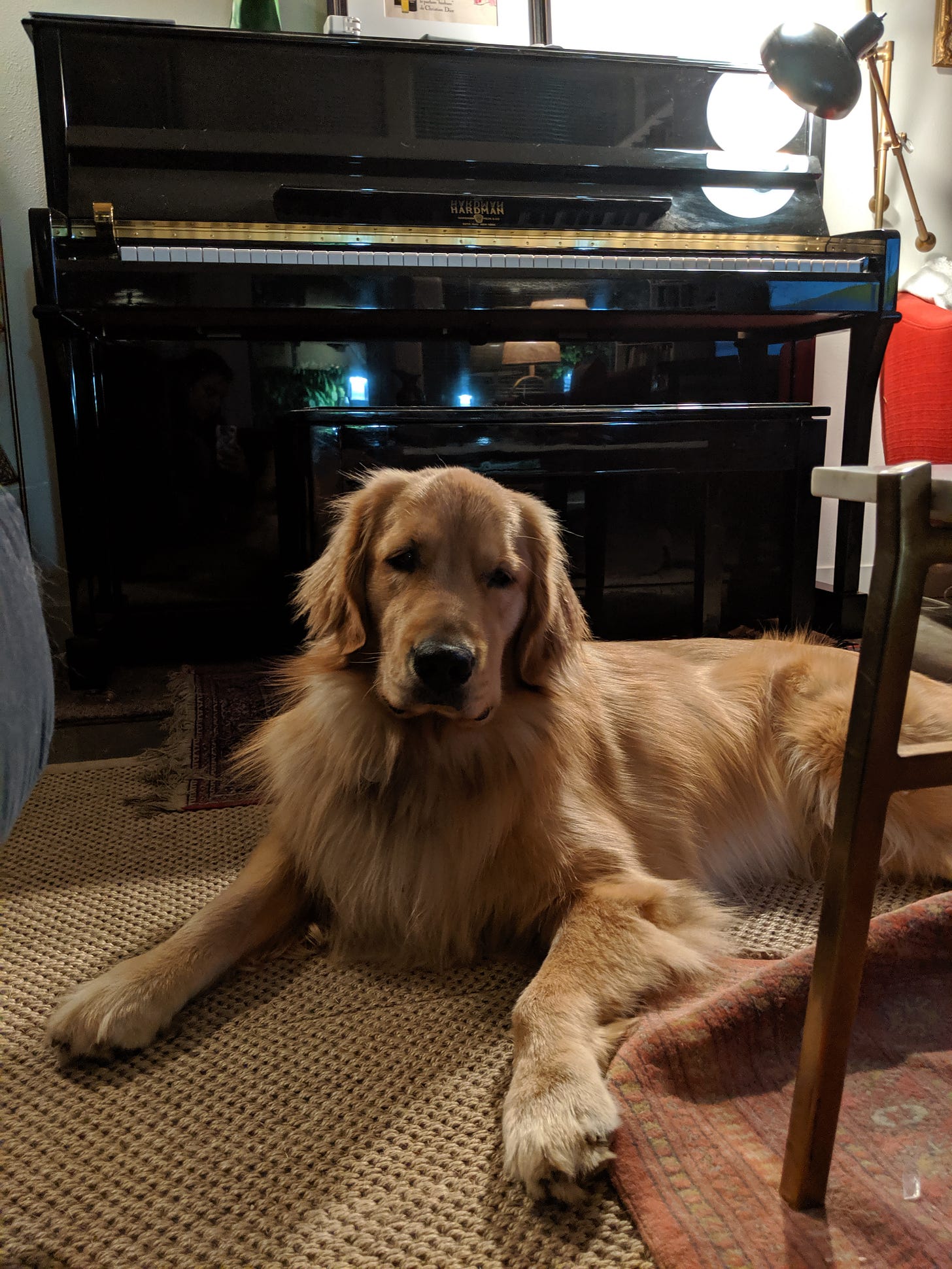In 2018 I got a puppy, a golden retriever I named Walter. When people ask me who he’s named after, sometimes I say Walter Raleigh, but the reality is that I just wanted a dignified and slightly old-fashioned name — in this I am apparently in line with my age peers. When Walter was still young, my then-boyfriend suggested I could now stop taking anti-depressants, since dog ownership would likely cure me (it didn’t). I’ve raised Walter mostly on my own, and he’s made my life richer, healthier, and more connected. It goes without saying that I love him dearly. However, whenever I see someone propose getting a dog to help with depression or anxiety, I have to raise an eyebrow.
In the two and a half years he’s been with me, Walter has done the following upsetting and anxiety-producing things:
Swallowed a ziploc bag whole off the street. It contained one (1) dog treat.
Snatched hats from people’s heads and hands, as well as gloves, eyeglasses, and face masks. I paid out of pocket to replace the eyeglasses, which were scratched by his teeth.
Grabbed dog bags full of excrement out of people’s hands, eaten them, then thrown them up on my floor.
Urinated on the floor of a city bus, which I tried to wipe up with one of his stuffed toys
Destroyed books, shoes, furniture, clothing, and many other things I’m forgetting. This one people know to expect when they get a dog (along with housebreaking accidents), even if they don’t expect the rest.
Having a dog makes me visible on the street in a way that sometimes makes me anxious: for better and for worse, I’m more approachable with a dog. When Walter was little and cute, people would cross the street to come pet him. One man engaged me in conversation while I was waiting for a train to pass, started to cry while talking about his own childhood dog, then asked for my phone number. I’ve also had strange men try to call Walter to them, and it takes a lot of strength to keep him from dragging me in their direction, so eager is he to meet people. Now that he is big, the visibility remains but the conversations change. I am exposed to public judgement: strangers often give me opinions about what I should and shouldn’t be doing with my dog.
Walter was the star of his obedience class, learns commands quickly, was housebroken swiftly and easily, and is generally a Good Boy, of which I remind him frequently. But he is smart enough to figure out loopholes in the system and often behaves badly, particularly when meeting new people. In particular, he’s a jumper and he’s grabby, and when people ask to pet him I need to warn them to put their gloves away, or he’ll steal them. With children, I know that he will try to take their toys, and it’s with some horror that I see a toddler approach with a stuffed animal in one hand and the other outstretched to pet him. Usually people are kind about it, but more than one has sharply admonished me: control your dog! In these moments I’m full of shame. I’m trying, I always think, but clearly not enough. On dates, more than one man has told me how much they love dogs, but then recoiled from Walter’s exuberance once they meet him. Your mom didn’t train you very well, one said when Walter tried to climb into his lap, and you’re too chubby. Writing this out now, I’m surprised at how painful this memory still is — painful because I loved Walter so much.
The memory that fills me with the most shame is this one: I was waiting for the bus downtown, and Walter was still a puppy. A homeless man approached, smiling and eager to pet him, and Walter was delighted to make a friend. The man had a fresh and neatly folded hand towel from a gym dangling from his belt, and Walter playfully snatched it away. It took some effort to get the towel back, and when I finally got it out of his mouth it had a small tear. The man insisted that I let the puppy keep it, then continued on. When I boarded the bus a minute later, someone nearby said, intending for me to hear: some people really shouldn’t own animals.
I wish I could explain to Walter that if he were a little less demonstrative, a little less eager, he would get more of the love he craves from other people. People are given this advice too and usually take it to heart, no matter how much therapists try to talk them out of it. I think Walter would find this notion counterintuitive.
Having a dog has made my life better in ways that I didn’t anticipate, and ways I might not have chosen for myself. Most importantly: rain or shine, the dog must be walked. There’s no hermiting around the apartment all weekend, no wasted mornings spent brooding in bed. Sad, exhausted, hungover, sick — the dog still needs a walk, which means I have an ironclad routine. Dog ownership has also made me a part of my neighborhood in a way I never would have been otherwise. I know the other dog owners and we greet each other on the street, and now they’re people I can borrow tools or a cup of sugar from. In my adult life it’s the closest to a neighborhood, in the Mr. Rogers sense, I’ve ever been. And of course there’s the comfort that comes from having a companion who greets you when you come home, who curls up next to you on the sofa, who expresses concern when you’re upset and plays with you when you’re happy: those things cannot be overstated. They are real and beautiful and important.
I tell Walter I love him all the time, more often than I say it to any human. You can do that with a dog, knowing they will never find your love burdensome. Sometimes I wonder if he would be happier living with a family in a house with a big backyard, and I humor myself by thinking that if I could ask him, he’d say he prefers to be with me. He’s actually getting so much better, I tell my friends when he’s straining to jump on them. They usually don’t believe me, but it’s true.
I send an email once a week. Do subscribe if you like. Walter also has his own Instagram: it’s @mad_about_the_walter.






Treasure Walter. Lost Ringo a year ago. Still reeling. On streets now, I don’t people-watch the way I used to, but I spot every dog, and almost every one delights.